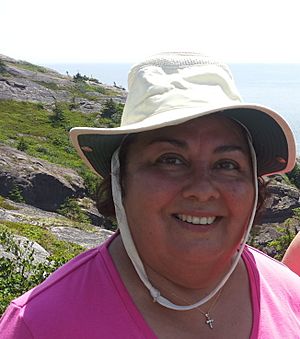Rose Boyko facts for kids
Quick facts for kids
Rose Boyko
|
|
|---|---|
 |
|
| Born | 1950 (age 75–76) |
| Education | Queen's University |
| Occupation | lawyer, judge |
Rose Toodick Boyko is a Canadian First Nations lawyer and a judge who is now retired. She made history by becoming the first Indigenous woman to be appointed as a superior court judge in Canada. Her mother was from the Sekani people, and her father was Ukrainian. She is a member of the McLeod Lake Indian Band. Rose was born in 1950. She remembers growing up on a trapline near the Parsnip River in northern British Columbia. Her family's trapline was flooded in 1967 when the W. A. C. Bennett Dam was built.
About Rose Boyko's Life
Rose Boyko first trained to be a nurse. She earned her nursing diploma from the Royal Victoria Hospital in Montreal in 1972. After that, she worked as a nurse in remote Cree communities in the James Bay area. She also worked as a critical care nurse at Kingston General Hospital, helping people who were very sick.
Later, Rose decided she wanted to study law. She took special pre-law courses at the Saskatchewan Aboriginal Law Program. Then, she went to law school at Queen's University, where she received her law degree in 1980. She became a lawyer in Ontario in 1982 and in Saskatchewan in 1988.
Rose Boyko's Career as a Judge
Rose Boyko started her legal career working for the Department of Justice in different provinces like Ontario, Alberta, and Saskatchewan. The Department of Justice helps make sure laws are followed and people are treated fairly. From 1989 to 1991, she worked with the Quebec Ministry of Justice in Quebec City.
After that, she moved to Ottawa to work for the Department of Indian Affairs. She stayed there until 1994, when she was appointed to the Ontario Superior Court. This meant she became a judge who hears important cases. She retired from being a judge in 2008.
Awards and Recognition
Rose Boyko has received many special awards for her work. In 1997, she was given an honorary Doctor of Laws degree from Queen's University. This is a special award that recognizes her achievements, even though she didn't study for that specific degree.
In 1999, she received a National Aboriginal Achievement Award. This award, now called the Indspire Awards, celebrates the achievements of Indigenous people in Canada. Rose received it in the Law and Justice category. In 2008, she was chosen to be part of the United Nations Appeals Tribunal, which is a court that handles appeals for people who work for the United Nations.
In 2012, Rose Boyko received the Queen Elizabeth II Diamond Jubilee Medal. This medal was given to Canadians who had made important contributions to their country.
 | Victor J. Glover |
 | Yvonne Cagle |
 | Jeanette Epps |
 | Bernard A. Harris Jr. |

